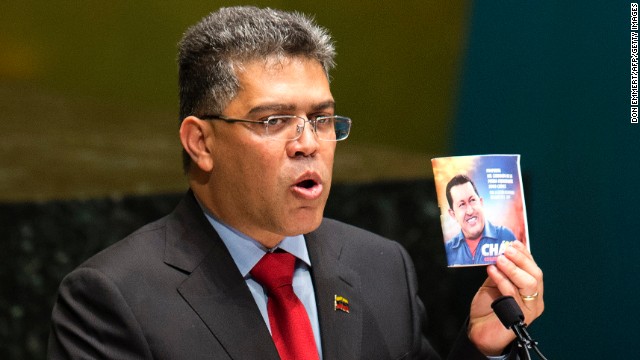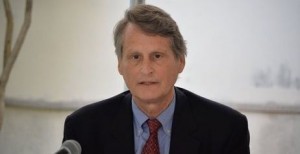
Do not meddle, Caracas tells Washington
CARACAS, Feb. 19 — (AVN) — At a meeting in Caracas with ambassadors from the Community of Latin American and Caribbean States (CELAC), the Venezuelan foreign minister, Elías Jaua, on Wednesday repeated his warning about the involvement of the United States in the acts of violence perpetrated by the right in Venezuela in recent days.
During the meeting, at the Foreign Ministry, Jaua delivered to the ambassadors an official statement that denounces the disrespect to Venezuelan sovereignty shown by the U.S. government.

“The government of the Bolivarian Republic of Venezuela wishes to inform you that on Feb. 16, 2014, the permanent representative of the Bolivarian Republic of Venezuela to the Organization of American States, Roy Chaderton, received a call from Mr. Alex Lee, deputy assistant secretary at the U.S. State Department, in which the government of the United States expressed a series of demands considered by the Venezuelan government to be unacceptable because they constitute an intromission into the internal affairs of our country,” Jaua read to the diplomats.
Notable among the demands of the U.S. government are calls to the Venezuelan government
- to initiate a process of dialogue with the Venezuelan opposition,
- to release the people arrested for the violent acts of Feb. 12, 2014, and ensuing days and
- to avoid arresting [opposition activist] Mr. Leopoldo López “because it could cause many problems and international consequences.”
In the statement he read on Wednesday, Jaua points out that the requests from the United States constitute a threat to Venezuela’s sovereignty and to the independence of the Judiciary Branch of Venezuela, which properly must determine the responsibilities in the [López] case.
“The government of the Bolivarian Republic of Venezuela has decided to keep the members of the Community of Latin American and Caribbean States informed about the gravity of the actions and demands formulated by the representative of the [U.S.] Department of State, which constitute a threat not only to Venezuela’s independence, security and sovereignty but also to the principles defended by our community,” the minister added.
On behalf of the Bolivarian government, Jaua asked the diplomats to convey that statement to their respective governments.
The principles that rule CELAC establish that the member nations participate in conditions of equality to confront the challenges to a region that, for the first time, enjoys a hemispheric institution for political dialogue, without hegemony or tutelage.
The CELAC is composed of 33 nations from Latin America and the Caribbean, created in 2011, without the United States and Canada.
On Feb. 17, Jaua announced that the governments of 20 countries and 156 social movements and political parties worldwide have expressed their solidarity with the government and the people of Venezuela, in the face of the foci of violence that are trying to destabilize the country.
At the Wednesday gathering, the foreign minister also repeated that the Venezuelan government guarantees the freedom of expression in a peaceful manner and watches over democracy as one of the pillars that support the Bolivarian Revolution.
He said that Venezuela is one of the countries that record the largest social mobilizations, which demonstrates the people’s absolute freedom to express their support of, or opposition to, the socialist transformation that the nation is undergoing.
“You are witnesses to how — through the printed, radial, and audio-visual media — the political and ideological differences with the Bolivarian Revolution are openly exposed, even beyond the democratic parameters, without anyone being detained or imprisoned for his political opinion,” Jaua said.
He recalled that the national government has been repeatedly legitimized by a nationwide majority in 18 elections carried out in the past 15 years.
Also, Jaua stressed that the opposition sectors can, through the ballot box, express their opinions to state — via the electoral route — their vision of how the country should be ruled.
“No government is going to change its political or ideological orientation just because someone on the streets asks it to. That is done in an election, and we, in 18 out of 19 elections, have openly proposed that the road and nature of the Bolivarian Revolution is socialism, and that has had the backing of a popular majority,” he said.
Jaua emphasized that Commander Hugo Chávez inculcated in the Venezuelan people a respect for questioning and demanding explanations from the public authorities; therefore, the country is permanently the object of popular participation from supporters of the Executive and from dissenters.
He guaranteed that Venezuela will democratically resolve the situation of focalized violence that some right-wing groups are fanning in various municipalities.
“We are in a position to democratically resolve the situation of focalized violence in some municipalities and cities with democratic authorities and popular mobilization and conscience,” he said.
The foreign minister pointed out that, in the event that the situation in Venezuela needed to be analyzed, the proper venue would be the Union of South American Nations (UNASUR).
“We consider that, in a first stage, the only organization that Venezuela would ask to consider the present situation, or accept its consideration, would be the UNASUR,” he said.


